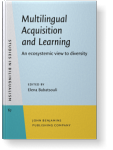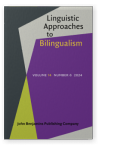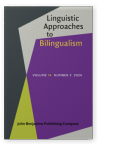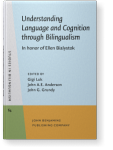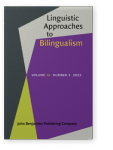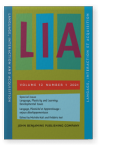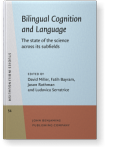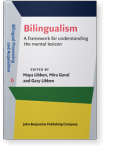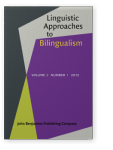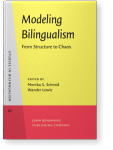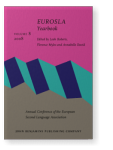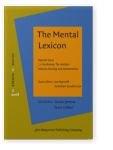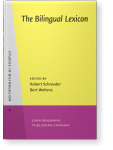Judith F. Kroll
List of John Benjamins publications for which Judith F. Kroll plays a role.
Book series
Journal
ISSN 1879-9264 | E-ISSN 1879-9272
2024 Proficiency in a second language influences processing of print-to-sound mappings Linguistic Approaches to Bilingualism 14:3, pp. 285–309 | Article
A hallmark of word naming in deep orthographies, effects of spelling-sound regularity and consistency are considered to reach stability in adulthood. We investigated whether these effects were modulated by second language (L2) proficiency in native English and native Spanish speakers.… read more
2023 Chapter 10. Models and metaphors: Mapping language experience to cognition Understanding Language and Cognition through Bilingualism: In honor of Ellen Bialystok, Luk, Gigi, John A.E. Anderson and John G. Grundy (eds.), pp. 210–229 | Chapter
Ellen Bialystok’s research on bilingualism and cognition has transformed our understanding of how life experience with two or more languages has enduring consequences for the mind and the brain. But how do these consequences arise? In this chapter we focus on models of bilingual language… read more
2022 Second language immersion impacts native language lexical production and comprehension Linguistic Approaches to Bilingualism 12:3, pp. 347–376 | Article
We investigated whether the features of the second language (L2) matter when we consider the consequence of short-term L2 immersion on performance in the native language (L1). We compared L1 performance in English-speaking learners of a typologically-dissimilar L2-Chinese immersed in Chinese… read more
2021 Capturing the variation in language experience to understand language processing and learning Language, Plasticity and Learning: Developmental Issues: Langage, Plasticité et Apprentissage : enjeux développementaux, Kail, Michèle and Frédéric Isel (eds.), pp. 82–109 | Article
A goal of early research on language processing was to characterize what is universal about language. Much of the past research focused on native speakers because the native language has been considered as providing privileged truths about acquisition, comprehension, and production. Populations… read more
2019 Chapter 3. Variation in language experience shapes the consequences of bilingualism Bilingualism, Executive Function, and Beyond: Questions and insights, Sekerina, Irina A., Lauren Spradlin and Virginia Valian (eds.), pp. 35–47 | Chapter
The use of two languages is common, but the circumstances that give rise to bilingualism are diverse. Recent discussions about the consequences of bilingualism have focused on how variation in language experience and use may differentially shape the engagement of cognitive control. In this paper,… read more
2018 Chapter 14. Words on the brain: The bilingual mental lexicon Bilingual Cognition and Language: The state of the science across its subfields, Miller, David, Fatih Bayram, Jason Rothman and Ludovica Serratrice (eds.), pp. 307–324 | Chapter
In this chapter, we view the recent evidence on the bilingual lexicon that points to a dynamic view of lexical processes. In contrast to earlier assumptions that words in the bilingual’s two languages were represented and processed independently, the findings of studies with both adults and… read more
2017 The bilingual lexicon: A window into language dynamics and cognition Bilingualism: A framework for understanding the mental lexicon, Libben, Maya, Mira Goral and Gary Libben (eds.), pp. 27–48 | Chapter
In some circles in psycholinguistics, there is the view that words are the least interesting aspect of language processing. In others, there is the view that monolingual speakers will tell us all that we need to know about language in the mind and the brain. In the past two decades there has been… read more
2012
Recent psycholinguistic research demonstrates that using a second language has consequences for the first language (e.g. Dussias, 2003; Van Hell & Dijkstra, 2002) and for domain-general cognitive processes (Bialystok, 2005). This work suggests that the language system is permeable, with… read more
2011 Psycholinguistic perspectives on language processing in bilinguals Modeling Bilingualism: From Structure to Chaos, Schmid, Monika S. and Wander Lowie (eds.), pp. 15–36 | Article
An observation in recent psycholinguistic research is that the use of a second language (L2) has profound consequences for cognitive processes that extend beyond language itself. Contrary to the notion that the task for the L2 learner is simply to acquire a level of skill that closely resembles… read more
2008 The role of language cues in constraining cross-language activity EUROSLA Yearbook: Volume 8 (2008), Roberts, Leah, Florence Myles and Annabelle David (eds.), pp. 6–31 | Article
Recent psycholinguistic studies provide compelling evidence for the claim that both languages are active when second language (L2) learners and bilinguals process information in one language alone. The parallel activation of the two languages occurs even when individuals are performing highly… read more
2008 Cross-language lexical processes and inhibitory control L2 Vocabulary: The interface between learning and representation, Barcroft, Joe and Gretchen L. Sunderman (eds.), pp. 349–374 | Article
Many recent studies demonstrate that both languages are active when bilinguals and second language (L2) learners are reading, listening, or speaking one language only. The parallel activity of the two languages has been hypothesized to create competition that must be resolved. Models of bilingual… read more
1993 Accessing Conceptual Representations for Words in a Second Language The Bilingual Lexicon, Schreuder, Robert and Bert Weltens (eds.), pp. 53–82 | Article
